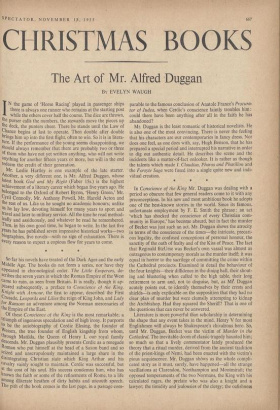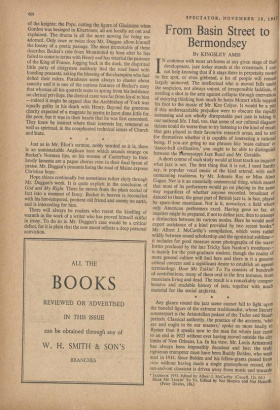CHRISTMAS BOOKS
The Art of Mr. Alfred Duggan
By EVELYN WAUGH IN the game of 'Horse Racing' played in passenger ships there is always one runner who remains at the starting post while the others cover half the course. The dice are thrown, the purser calls the numbers, the stewards move the pieces up the deck, the punters cheer. There he stands until the Law of Chance begins at last to operate. Then double after double brings him up into the first flight, often to win. So it is in litera- ture. If the performance of the young seems disappointing, we Should always remember that there are probably two or three Of them who have not yet written anything, who will not write anything for another fifteen years or more, but will in the end redeem the credit of their generation. Mr. Leslie Hartley is one example of the late starter. Another, a very different one, is Mr. Alfred Duggan, whose latest book God and My Right (Faber 15s.) is the highest achievement of a literary career which began five years ago. He belonged to the Oxford of Robert Byron, 'Henry Green,' Mr. Cyril Connolly, Mr. Anthony Powell, Mr. Harold Acton and the rest of us. Like us he sought no academic honours; unlike Its he lay low, devoting himself for many years to sport and travel and later to military service. All the time he read method- ically and assiduously, and whatever he read he remembered. Then, in his own good time, he began to write. In the last five Years he has published seven impressive historical works—two biographies, five novels—with no sign of exhaustion. There is every reason to expect a copious flow for years to come.
So far his novels have treated of the Dark Ages and the early Middle Age. The books do not form a series, nor have they appeared in chronological order. The Little Emperors, de- scribes the seven years in which the Roman Empire of the West came to ruin, as seen from Britain. It is really, though it ap- peared subsequently, a preface to Conscience of the King. knight with Armour, the first to appear, described the First Crusade, Leopards and Lilies the reign of King John, and Lady for Ransom an adventure among the Norman mercenaries of the Empire of the East. Of these Conscience of the King is the most remarkable; a triumph of ingenious speculation and of high irony. It purports to be the autobiography of Cerdic Elesing, the founder of Wessex, the true founder of English kingship from whom, through Matilda, the Queen of Henry I, our royal family descends. Mr. Duggan plausibly presents Cerdic as a renegade Roman who put himself at the head of a Saxon band and so seized and unscrupulously maintained a large share in the disintegrating Christian state which King Arthur and his cavalry vainly sought to maintain. Cerdic was successful, but at the cost of his soul. His success condemns him, who has known the faith or some of the refinements of Rome, to a life among illiterate heathen of dirty habits and uncouth speech. The pith of the book comes in the last page, in a passage corn- parable to the famous conclusion of Anatole France's Procura- tor of Judea, when Cerdic's conscience faintly troubles him : could there have been anything after all in the faith he has abandoned?
Mr. Duggan is the least romantic of historical novelists. He is also one of the most convincing. There is never the feeling that his characters are our contemporaries in fancy dress. Nor does one feel, as one does with, say, Hugh Benson. that he has prepared a special period and interrupted his narrative in order to dig out authentic detail. He describes the scene and the incidents like a matter-of-fact onlooker. It is rather as though the talents which made I. Claudius, Pharos and Pharillon and the Forsyte Saga were fused into a single quite new and indi- vidual creation.
In Conscience of the King Mr. Duggan was dealing with a period so obscure that few general readers come to it with any preconceptions. In his new and most ambitious book he adopts one of the best-known stories in the world. Since its famous, unfortunate employment by F. E. Smith the phrase: an act 'which has shocked the conscience of every Christian com- munity in Europe,' has become absurd, but in fact the murder of Becket was just such an act. Mr. Duggan shows the atrocity in terms of the conscience of the times—the intricate, precari- ous legality, the confused conceptions of personal honour, the sanctity of the oath of fealty and of the Kiss of Peace. The fact that Reginald fitzUrse was Becket's own vassal was almost as outrageous to contemporary morals as the murder itself; it was equal in horror to the sacrilege of committing the crime within the Cathedral precincts. Examined in detail the behaviour of the four knights—their diffidence in the dining hall, their shout- ing and blustering when called to the high table, their long retirement to arm and, not to disguise, but, as Mt'. Duggan acutely points out, to identify themselves by their crests and shields—is only explicable on the supposition that they had no clear plan of murder but were clumsily attempting to kidnap the Archbishop. Had they squared the Sheriff? That is one of the questions that can never be answered.
Literature is more powerful than scholarship in determining the shape that any event takes in the mind. Henry V for most Englishmen will always be Shakespeare's chivalrous hero. So, until Mr. Duggan, Becket was the victim of Murder in the Cathedral. The inevitable doom of classic tragedy haunted him; so much so that a lively commentator lately produced the theory that a ritual murder, derived from the ancient tradition of the priest-kings of Nemi, had been enacted with the victim's pious acquiescence. Mr. Duggan shows us the whole compli- cated story as it must, surely, have happened—all the strange vacillations at Clarendon. Northampton and Montmirail; the opposed temperaments of the two Normans, the King with his calculated rages, the prelate who was also a knight and a lawyer; the timidity and jealousies of the clergy; the oafishness of the knights; the Pope, cutting the figure of Gladstone when Gordon was besieged in Khartoum; all are lucidly set out and explained. The drama is all the more moving for being un- adorned. Only once or twice does Mr. Duggan allow himself the luxury of a poetic passage. The most memorable of these describes Becket's ride from Montmirail to Sens after he has failed to come to terms with Henry and has wearied the patience of the King of France. Jogging back in the dusk, the dispirited little party of clergymen suddenly find the road lined with kneeling peasants, asking the blessing of the champion who had defied their rulers. Paradoxes seem always to cluster about sanctity and it is one of the curious features of Becket's story that whereas all his quarrels seem to spring from his insistence on clerical privilege, the clerical caste was far from loyal to him —indeed it might be argued that the Archbishop of York was equally guilty in his death with Henry. Beyond the generous charity expected of a magnate he seems to have done little for the poor, but it was in their hearts that he was first canonised. They knew by instinct where their interests lay, temporal as well as spiritual, in the complicated technical issues of Church and State.
Just as in Mr. Eliot's sermon, nobly worded as it is, there is an unmistakable Anglican tone which sounds strange on Becket's Norman lips, so his women of Canterbury in their lovely laments are a pagan chorus even in their final hymn of praise. Mr. Duggan's peasants lining the road of Maine express Christian hope.
Hope shines continually but sometimes rather shyly through Mr. Duggan's work. It is quite explicit in the conclusion of God and My Right. There he moves from the plain recital of fact into a moment of fancy. Becket in heaven is reconciled with his hot-tempered, penitent old friend and enemy on earth, and is interceding for him.
There will always be readers who resent the kindling of warmth in the work of a writer who has proved himself skilful in irony. To do so in Mr. Duggan's case would be a critical defect, for it is plain that the new mood reflects a deep personal conviction.











































































 Previous page
Previous page